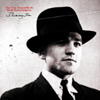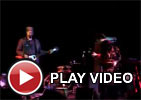The One Ensemble & Sarah Kenchington, "Dummy Jim"
 I haven’t seen Dummy Jim yet, but if this soundtrack is any indication, it must be a truly unconventional and memorable film. With the aid of bizarre instrument builder Sarah Kenchington, Daniel Padden and his cohorts have created a kaleidoscopic collision of traditional Anglo-folk, free jazz, drone, and deep-seated eccentricity that sounds like absolutely no one else.
I haven’t seen Dummy Jim yet, but if this soundtrack is any indication, it must be a truly unconventional and memorable film. With the aid of bizarre instrument builder Sarah Kenchington, Daniel Padden and his cohorts have created a kaleidoscopic collision of traditional Anglo-folk, free jazz, drone, and deep-seated eccentricity that sounds like absolutely no one else.
“Dummy Jim” was James Duthie, a deaf-mute Scotsman who embarked upon a 10,000 mile bicycle tour in 1951. A copy of Duthie’s rare published journal (I Cycled into the Arctic Circle) found its way into a used bookstore on the Isle of Iona. As it happens, director Matt Hulse’s mother worked there and she snapped it up and brought it home. Hulse was immediately struck by the strangeness and warmth of Duthie’s tale and Dummy Jim soon came into being. To Hulse’s great credit, he has enlisted some of the only musicians around that are idiosyncratic enough to befit the subject matter. Few directors would risk using music this attention-grabbing in a film.
The music here will probably not surprise anyone that is familiar with The One Ensemble’s previous work, but it is likely to be revelatory for those who haven’t. The album is made up 19 pieces of varying lengths, some of which are actual songs with vocals (usually by Aby Vulliamy) and some are more incidental in nature. The Ensemble’s aesthetic remains quite coherent throughout though: Dummy Jim is a very organic and abstractly folky album, built around haunting strings, wheezing horns, and sleepy woodwinds. Of course, Kenchington’s instrumental Frankensteins are far from traditional in appearance and performance, but they all basically still sound like brass or wooden instruments, so there are no jarring stylistic shifts.
The similarities to traditional folk music pretty much end at instrumentation and timbre, however (although some relatively straightforward melodies make intermittent appearances). The Ensemble’s odd lurching rhythms, creative layering, and shambling interplay combine to transform rather basic materials into something quite unique. These same characteristics are prominently displayed on the songs written by Kenchington too, as her mechanized sculptures often lock into odd, repeating loops of strange, disjointed sounds that slowly cohere and escalate in intensity (such as in “Cows”). Incidentally, the liner notes don’t make it entirely clear whether any collaboration occurred between Sarah and the Ensemble, aside from on just one track. I don’t think there was, though Kenchington and Padden have recorded together in the past. Regardless, the album fits seamlessly together anyway.
The whole album is generally compelling and is probably best when taken in its entirety, but there are three distinct types of songs (aside from the handful of rather brief Kenchington pieces). First, there are the dense, rippling drone pieces, such as “Universal Wonders” or “Lumberjacks,” which approximate the low drone of a bagpipe ensemble using bowed strings and sustained brass, while clattering improvised percussion skitters and crashes all around. Then there are some relatively straightforward soundtrack pieces, such as the quirky and propulsive “Better to Wear Out Shoes Than Sheets,” which sometimes feature some achingly beautiful intertwining strings. Even these pieces sound unique, as Padden and company imbue them with a ragged humanity and subtle avant-garde touches like prickly microtones. Finally, there are bizarre, cartoonishly stumbling pieces like “A Couple of Jumpers,” which undulate like inebriated caterpillars. As a consequence, the album follows a rather odd trajectory, rife with unexpected twists.
Notably, I have generally not been a big fan of Padden’s work in the past, as I could not get past his absurdist tendencies or manic forays into the Zornification of Jewish/Eastern European melodies. Those tendencies are largely minimized here, however, enabling me to finally appreciate The One Ensemble’s strange and beautiful vision without distraction (I guess I have some back catalog reevaluating to get started on). Obviously, music this fiercely individualistic is not for everybody, but if a deranged, but skillfully harnessed, mash-up of Ornette Coleman, Harry Partch, Dexy’s Midnight Runners, and Captain Beefheart sounds at all appealing, this is a pretty great place to start. Regardless, Dummy Jim is anything but boring.
Samples:



